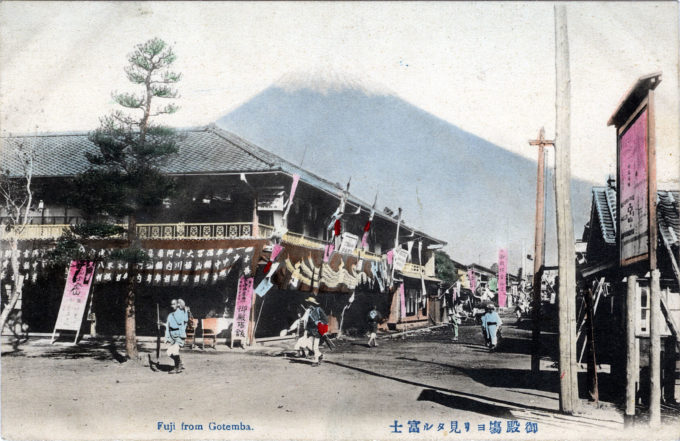
“Fuji from Gotemba”, c. 1910. Gotemba is located on the southeastern flank of Mount Fuji in Shizuoka Prefecture. The opening of Gotemba Station on what was then the Tōkaidō Main Line in 1889 spurred tourist development of the area.
See also:
Views of Mt. Fuji, c. 1910-1950.
“Fuji mountain from Suzukawa”, 1906.
Mt. Fuji, from Yuigahama, Kamakura, c. 1920.
Mt. Fuji and Lake Hakone Railway Access and Bus Routes, c. 1930.
“The shortest way of reaching [Mt.] Fuji from Yokohama is to take the rail as far as Gotemba station where guides, horses, foreign saddles, as well as rough quilts and charcoal to ward off the cold air at night in the huts on the mountain top, can be procured.
“It is advisable to take plenty of warm clothing, as the temperature falls below freezing-point at night on the summit of the mountain even during the hottest period of summer. It is also prudent to take an extra supply of food, as parties have occasionally been detained on the mountain side by stress of weather, unable either to reach the summit or to descend to the base.
“… It is possible, by starting at dawn, to reach the summit and descend again in a single day (in local Japanese parlance hi-yama, that is, ‘day-mountain’). Counting the working day as having 15 hrs. (4 a.m. to 7 p.m.), this would allow 10 hrs. for the ascent, including short stoppages, 2 hrs. at the top, and 3 hrs. for the descent. The shortest time in which the ascent and descent have been known to be made from Gotemba station, including stoppages, is 9 hrs. 8 min., of which 6 hrs. 50 min. were occupied in the ascent.
“But persons less desirous of ‘breaking the record’ than of really seeing what they have come so far to see, are strongly urged to pursue the following course: leave Gotemba station or Murayama before daylight — say at 2 a.m. — thus including the glory of sunrise on the way up. After sunrise, do the remainder of the ascent slowly, reaching the summit about midday.
“Having established oneself in one of the huts on the summit, the traveller should go down into the crater, make the round of the crater, and spend the night at the top. This will afford the chance of a sunset and of a second sunrise, after which last the descent can be at once begun. The descent walk take most people from 4 hrs. to 5 hrs.
“The great advantage of this plan is that it multiplies the chances of a good view from the summit — such views being much more often obtained at sunrise and sunset than in the middle of the day, and being by no means certain at any time.”
– A Handbook for Travellers in Japan, by Basil Hall Chamberlain & W.B. Mason, 1903


Pingback: “The way to upmt [sic] Fuji from Gotenba”, Climbing Mt. Fuji, Gotemba, c. 1920. | Old Tokyo